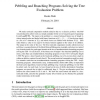163 search results - page 15 / 33 » Solving Simple Stochastic Games |
AAAI
2008
13 years 10 months ago
2008
This paper examines, by argument, the dynamics of sequences of behavioural choices made, when non-cooperative restricted-memory agents learn in partially observable stochastic gam...
TLCA
2001
Springer
14 years 4 days ago
2001
Springer
Using methods drawn from Game Semantics, we build a sound and computationally adequate model of a simple calculus that includes both subtyping and recursive types. Our model solves...
ACL
2006
13 years 9 months ago
2006
To study PP attachment disambiguation as a benchmark for empirical methods in natural language processing it has often been reduced to a binary decision problem (between verb or n...
CORR
2010
Springer
13 years 7 months ago
2010
Springer
We study restricted computation models related to the tree evaluation problem. The TEP was introduced in earlier work as a simple candidate for the (very) long term goal of separa...
AI
2008
Springer
13 years 7 months ago
2008
Springer
We make a number of contributions to the study of the Quantified Constraint Satisfaction Problem (QCSP). The QCSP is an extension of the constraint satisfaction problem that can b...


